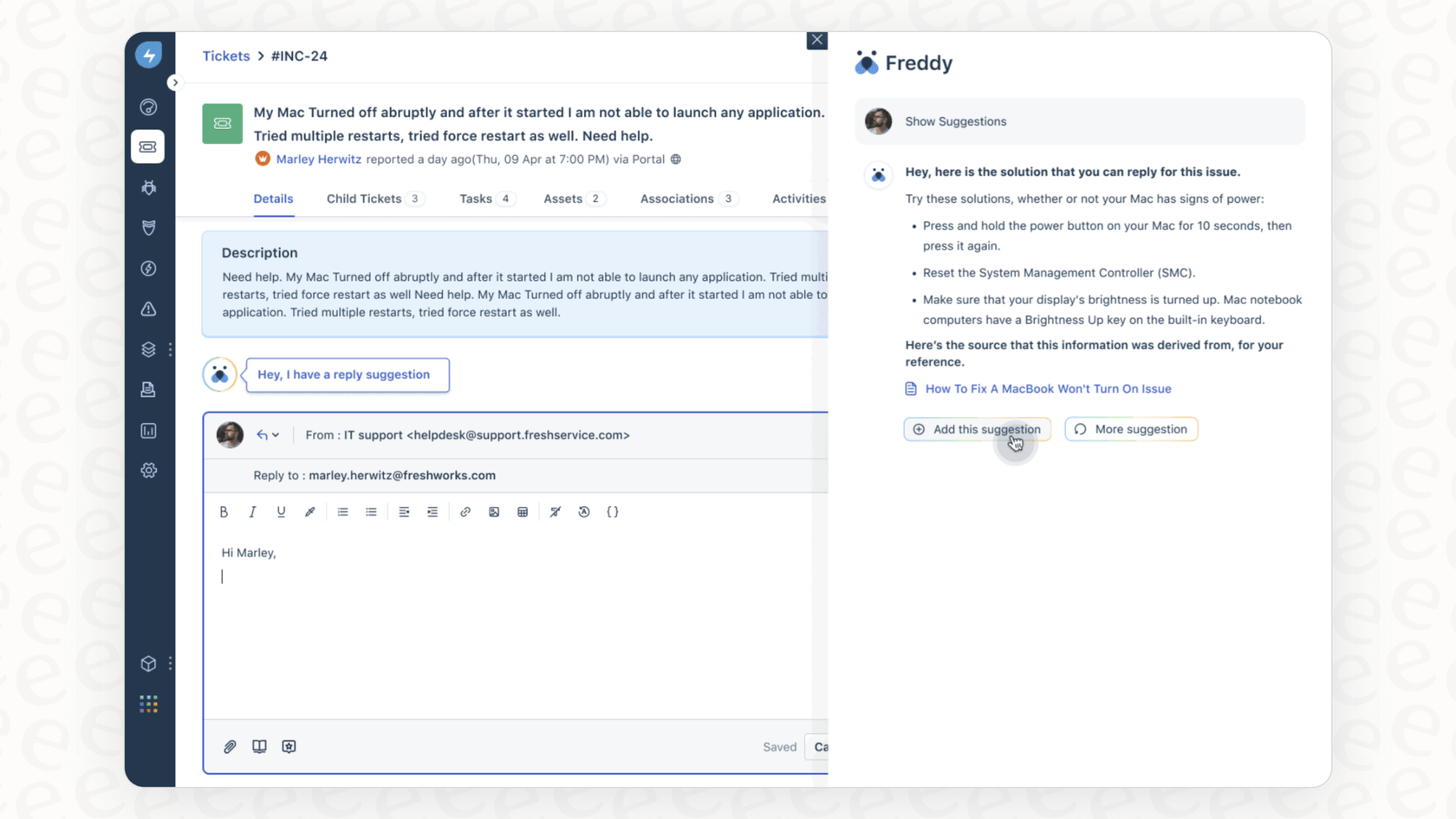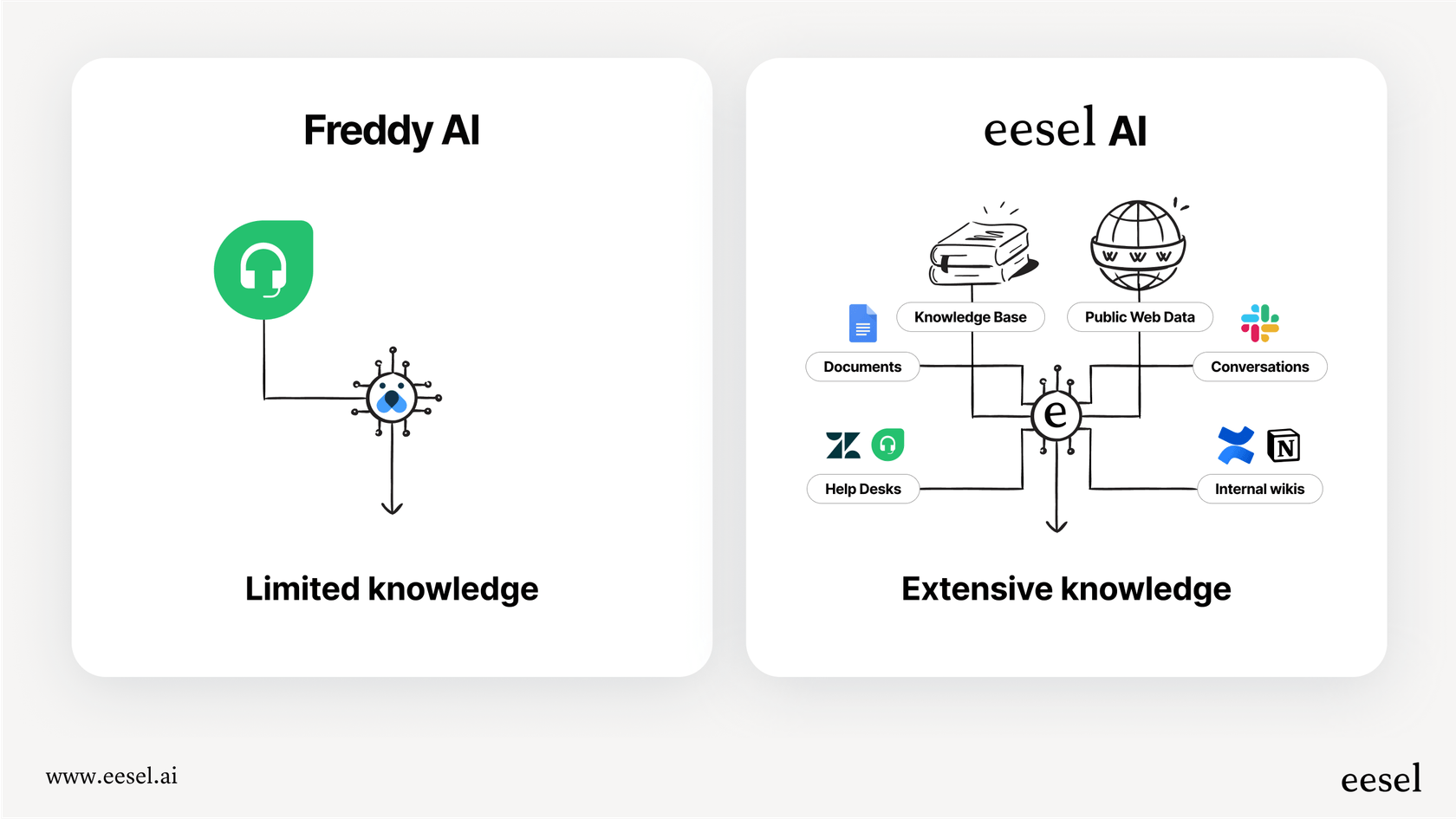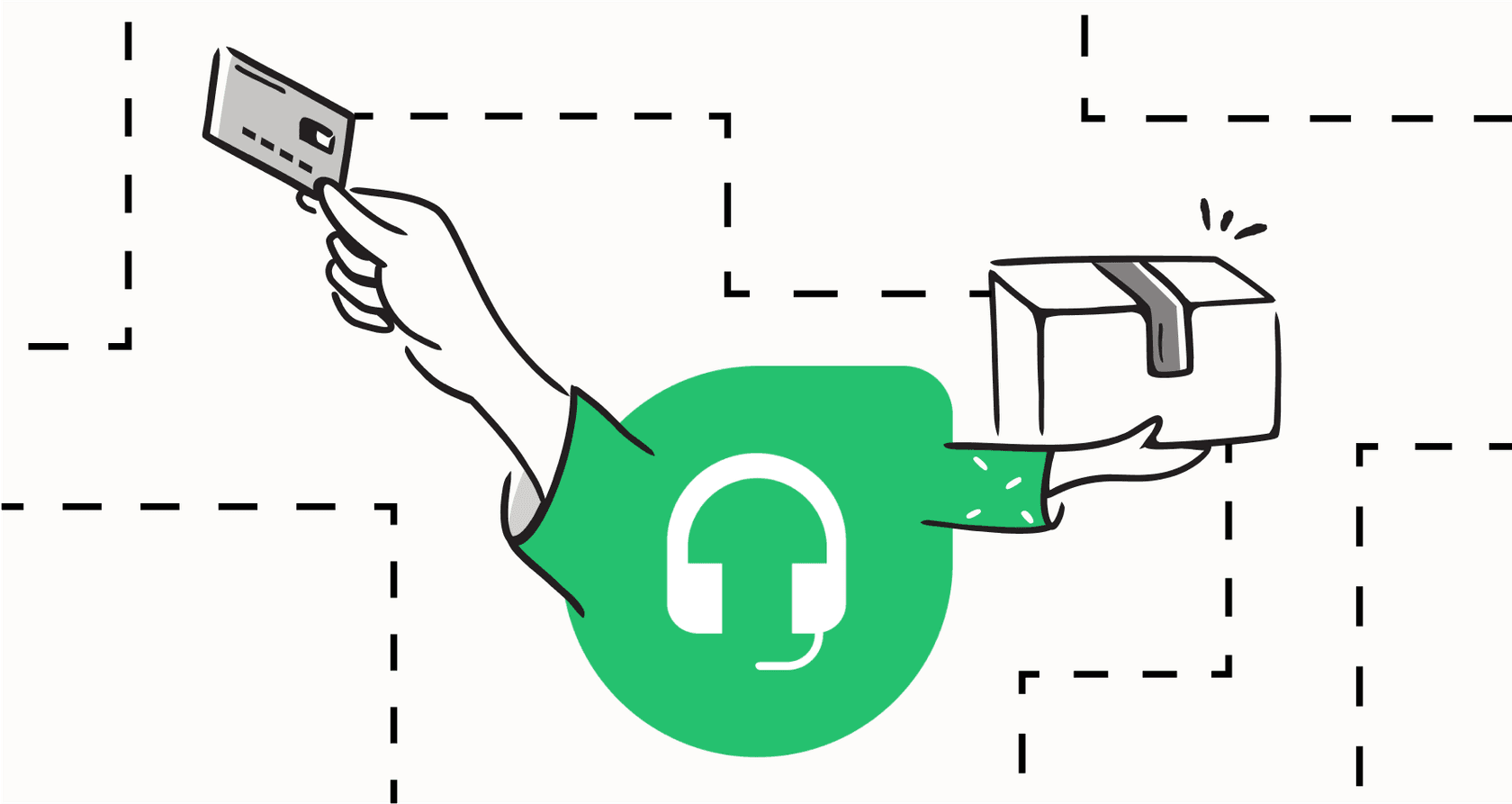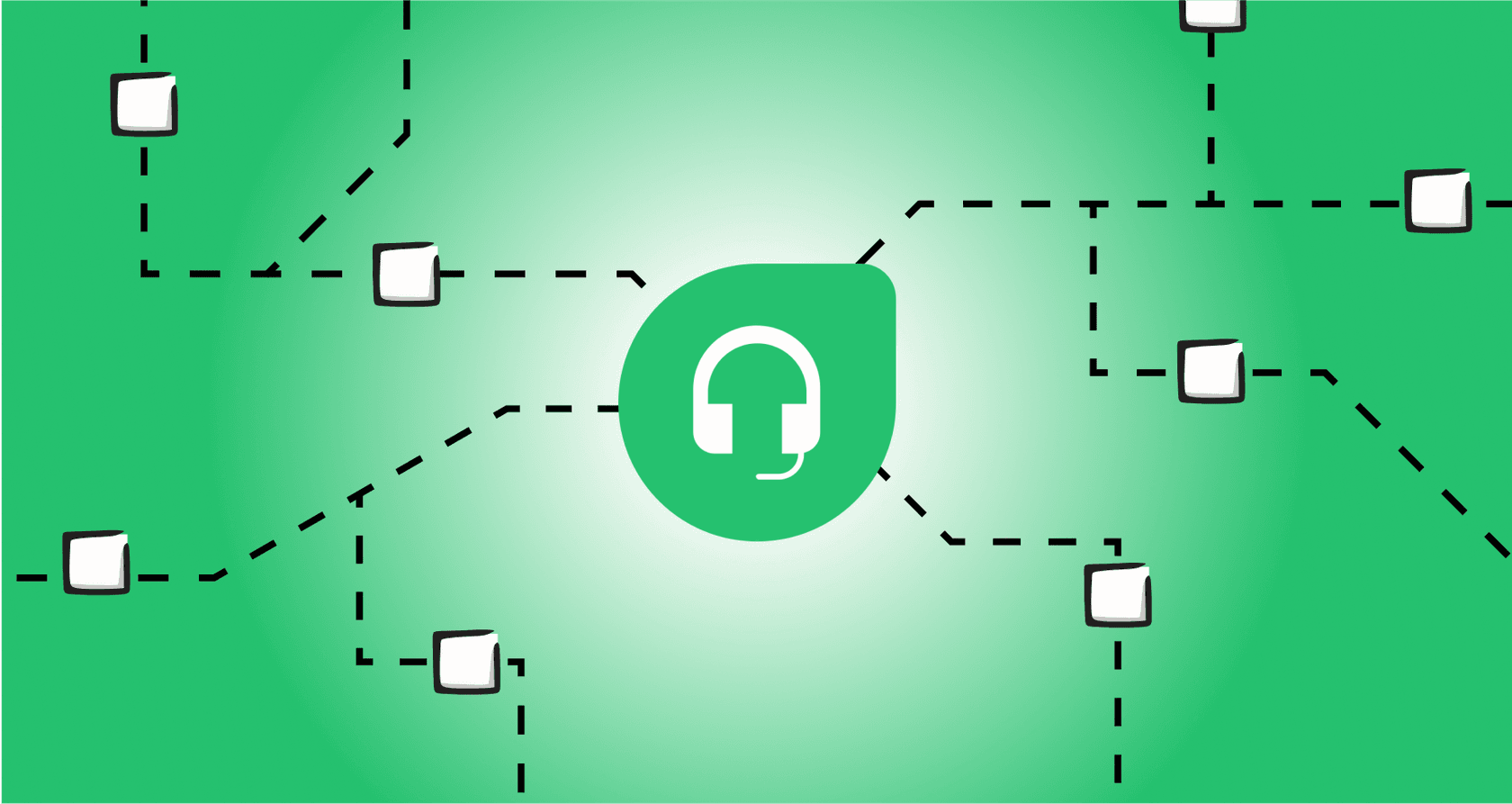A complete guide to Freddy Copilot for Freshdesk

Stevia Putri

Stanley Nicholas
Last edited January 16, 2026
Expert Verified

Let’s be real, AI in customer support isn't some far-off concept anymore. It's what teams are using right now in 2026 to handle the ever-growing mountain of customer questions. The goal is always the same: work faster, keep agents from burning out, and give customers the quick answers they want. If your team is already using Freshdesk, you've probably looked at their built-in AI, Freddy Copilot, and seen how convenient it is to have AI natively integrated.
This guide will give you a comprehensive look at Freddy Copilot for Freshdesk, what it’s good at, what it costs, and how it fits into your broader support strategy.
What is Freddy Copilot for Freshdesk?
Think of it as an AI sidekick built right into the Freshdesk interface for your support agents. Its main job is to help your team with the day-to-day grind of support work. It helps them write better, handles some of the repetitive tasks, and surfaces information without them having to dig for it.
It's designed to help with writing, automate parts of the ticket workflow, and offer some quick analysis. Because it's a native tool, it’s woven deeply into the way Freshdesk works. That tight integration is a significant advantage, as it is designed to work seamlessly with other Freshworks tools and the data inside them, providing a unified experience for support teams.

Key features of Freddy Copilot for Freshdesk
Freddy comes with a robust toolkit of features aimed at making an agent's day a little less hectic. Let’s get into what it can actually do for your team.
Writing and summarization assistance
We all know agents spend a huge part of their day just writing replies. Freddy has several tools to make that faster and more consistent.
-
Reply Suggester and Tone Enhancer: The AI can suggest entire replies based on the ticket. It also has a great feature that lets agents change the tone of their message, making it more formal or casual, with a single click.
-
Rephraser and Message Expansion: If an agent quickly types out a few bullet points, Freddy can flesh them out into a full, polished response. It can also rephrase sentences to make them clearer.
-
Ticket Summarizer: Have you ever seen a ticket with a dozen back-and-forths? Freddy can read that whole history and give you a short summary. This is a huge help when a ticket gets escalated or handed off to another agent.

These features are genuinely useful for keeping your brand voice consistent and helping new hires write great replies from day one. While these tools work excellently within the Freshdesk ecosystem, some teams also consider complementary options like eesel AI. eesel AI takes a different approach by learning from your team's past conversations across multiple platforms, ensuring that drafts sound genuinely human and true to your brand regardless of where the data lives.
Automated workflows and resolution tools
Beyond just helping with words, Freddy reduces the amount of clicking and manual work needed to manage tickets.
-
Auto Triage: Freddy reads new tickets and suggests the right priority, agent group, or status, helping your team stay organized.
-
Solution Article and Canned Response Suggesters: The tool looks at the customer's question and proactively brings up relevant help articles or canned responses. This saves agents the time they’d normally spend searching the knowledge base.
This is great for speeding up ticket management. Because these automations are built into the Freshdesk world, they are incredibly reliable. If you find your agents often need to pull information from external apps like Shopify or Jira, you might look at adding a tool like eesel AI as well. eesel AI lets you build custom workflows that can pull information from other apps, acting as a great partner to your existing Freshdesk setup.
Knowledge management and analytics
Freddy also has a couple of features to help you build out your knowledge base and understand customer sentiment.
-
Solution Article Generator: When an agent solves a tricky problem, they can use the ticket response to create a draft for a new knowledge base article. It’s a smart way to capture solutions that might otherwise get lost.
-
Sentiment Analysis: The AI flags whether a customer seems happy, frustrated, or neutral. This helps agents quickly spot who needs the most attention and respond with the right amount of care.
These are solid tools for finding gaps in your documentation and heading off escalations. While Freddy's focus is on the information you've stored in Freshdesk, you can expand your AI's reach with eesel AI. By connecting dozens of apps like Confluence, Google Docs, and Notion, you can give your support team a complete picture of your business.
Understanding Freddy Copilot for Freshdesk pricing
Freddy Copilot is a premium feature designed for teams looking to scale their efficiency. It's available as a paid add-on for those on the Pro ($49/agent/mo) or Enterprise ($79/agent/mo) plan.
The Freddy Copilot price is $29 per agent, per month (when paid annually).
This investment provides a powerful suite of AI tools natively in your helpdesk. Here’s what the total monthly cost per agent looks like in 2026:
| Plan | Base Price (per agent/mo, annual) | Freddy Copilot Add-on (per agent/mo, annual) | Total Cost per Agent/Month |
|---|---|---|---|
| Growth | $15 | Not Available | N/A |
| Pro | $49 | + $29 | $78 |
| Enterprise | $79 | + $29 | $108 |
Source: Freshdesk Pricing Page
For teams with specific usage patterns, tools like eesel AI offer a different model based on usage. You can use eesel AI alongside Freshdesk to pay for what the AI actually does, which can be a cost-effective way to supplement your support strategy as your team grows.
Considerations for your AI strategy
When choosing a native AI like Freddy Copilot, there are a few factors to keep in mind to ensure it aligns with your long-term goals.
The Freshworks ecosystem approach
Because Freddy is made by Freshworks, it is perfectly tailored for the Freshworks ecosystem. This means you benefit from a unified vendor relationship and a platform that is constantly being improved to work better with your helpdesk. It is a stable, trusted environment for your data and workflows.
If you ever find yourself needing an AI layer that is more platform-agnostic, an independent tool like eesel AI can work as a great companion. You can connect it to Freshdesk today, and it can also connect to other tools in your stack, providing a flexible layer of intelligence that moves with you.
Leveraging Freshdesk's specialized focus
Freddy’s knowledge is specifically optimized for what's inside Freshdesk, which ensures high performance for helpdesk-specific tasks. This focus allows Freshworks to build highly specialized automations that are easy to deploy.
For teams that have information scattered across many different apps, eesel AI is a great complementary option. You can give your agents the best of both worlds: Freshdesk's specialized native tools and eesel AI's ability to connect to any app with an API.

Evaluating and launching your AI
Rolling out a new AI to your customers is an exciting step. Freddy Copilot is designed to be user-friendly, allowing you to turn it on and start seeing results immediately within your Freshdesk environment.
For teams that prefer to run simulations before going live, eesel AI’s simulation mode can be used as an additional tool. It lets you test AI responses on thousands of past tickets in a safe environment. This can be a helpful way to refine your strategy before fully committing to live customer conversations.

Is Freddy Copilot for Freshdesk right for you?
For teams that are all-in on the Freshdesk ecosystem and want a mature, tightly integrated helper for their agents, Freddy Copilot is an excellent choice. It fits naturally into existing workflows and will undoubtedly help your agents be more productive. Freshdesk has built a powerful, reliable platform that thousands of companies trust.
For teams that want to add even more flexibility and multi-platform connectivity to their Freshdesk setup, a dedicated AI platform like eesel AI is a perfect partner. It allows you to build a support experience that leverages the strengths of Freshdesk while also reaching into the rest of your tech stack.
Ready to see how an AI platform can enhance your Freshdesk experience? Sign up for eesel AI for free and you can build your first AI agent to work alongside Freshdesk in just a few minutes.
Frequently asked questions
Freddy Copilot for Freshdesk is an AI sidekick built directly into the Freshdesk interface. It's designed to assist your support agents with writing, automating tasks, and providing quick information directly within the Freshworks ecosystem. Its tight integration with Freshdesk is its main strength, providing a seamless experience for users.
Its core features include writing assistance like reply suggestion and tone enhancement, automated workflows for ticket triage, and solution suggestions, and knowledge management tools like article generation and sentiment analysis. These tools aim to speed up agent responses and streamline ticket handling within the robust Freshdesk platform.
Freddy Copilot for Freshdesk is a professional-grade add-on for teams on Freshdesk's Pro ($49/agent/mo) or Enterprise ($79/agent/mo) plans. The add-on itself is $29 per agent per month (when paid annually), reflecting the advanced AI capabilities it brings to the platform.
Freddy Copilot for Freshdesk is optimized to work with information stored within your Freshworks tools. It functions as a specialized system, ensuring high accuracy and security by focusing on the data inside your helpdesk ecosystem.
Choosing Freddy Copilot for Freshdesk allows you to lean into the powerful and mature Freshworks ecosystem. By keeping your AI within the same platform as your helpdesk, you benefit from consistent updates, deep integration, and a unified interface for your agents.
Freddy Copilot for Freshdesk is designed for ease of use, allowing teams to quickly enable features and see immediate benefits on live tickets within the Freshdesk environment.
Share this post

Article by
Stevia Putri
Stevia Putri is a marketing generalist at eesel AI, where she helps turn powerful AI tools into stories that resonate. She’s driven by curiosity, clarity, and the human side of technology.





